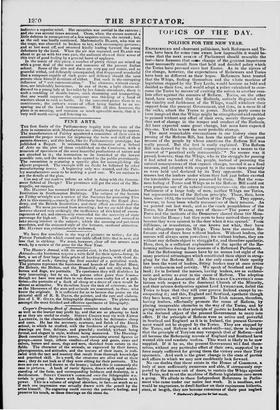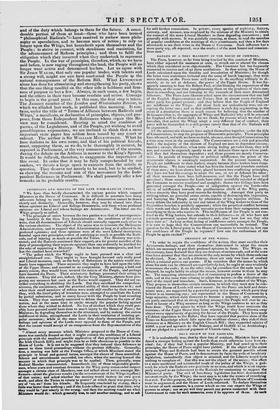ToP1CS OF THE DAY.
POLITICS FOR THE NEW YEAR.
EXPERIENCED and observant politicians, both Reformers and To- ries, have been for some time aware how impossible it would be.
come that the next session of Parliament should resemble the last—have foreseen that some change of the greatest importance must necessarily result from that bold and decided policy which the Tories have pursued since last Easter. As to the nature of the change, however, the expectations of Reformers and Tories have been as different as their hopes. Reformers have trusted that the Whigs, finding themselves and the whole machine of
legislation stopped by the Tory Lords, would become as bold and decided as their foes, and would adopt a policy calculated to over-
come the Tories by means 'of exciting the nation to another reso- lute effort against the enemies of Reform. Tories, on the other hand, have expected that the Radicals, entirely disgusted with the timidity and feebleness of the Whigs, would withdraw their support from the present Government, and tints, in a mere fit of the sulks, admit the Tories to power. Neither party seems to have imagined that the Whigs might be strengthened and enabled to proceed without any effort of' their own, merely through ano- ther sort of change in the temper and conduct of the Radicals. All have expected some great change, but none have expectcd this one. Yet this is now the most probable change.
The most remarkable circumstance in our history since the passing of the Reform Bill, has been the apathy of those great masses of the people by whose exertions the Reform Bill was really passed. But the fact is easily explained. The Reform Bill was desired for its natural consequences—as a means to the removal of " practical evils innumerable:* No sooner was it
passed, however, than the Whigs, who in the struggle for passing it had acted as leaders of the people, instead of pursuing the natural consequences of that organic change, treated it as a final measure, and adopted with respect to it the same views precisely as were held and declared by its Tory opponents. Thus the masses lost the leaders under whom they had just before exerted the irresistible power always possessed by them. But the com- mon feeling of Tories and Whigs as to the Reform Bill could not even postpone one of its natural consequences—viz. the return to Parliament of a large body of men, neither Whigs nor Tories, but representatives of the Reform principle. These, then, have been, since 1832, the natural leaders of the People. They appear, however, to have been wholly unconscious of their mission. As we pointed out last week, and as the crack pamphleteer of the Tories, Sir JOHN WALSH, says of therri—" The power of the Press and the instincts of the Democracy shoved these 160 Mem- bers into the House ; but they seem to have arrived there merely because they were nearest to the door when it was opened: From diffidence, or irresolution, or one knows not what, they have relied altogether upon the Whigs. Thus have the earnest Re- formers out of doors been without leaders. Without leaders, the masses will always seem powerless; for without leaders, they am without any definite object to struggle for, and therefore apathetic. Here, then, is a sufficient explanation of the apathy of the Re- forming millions during four sessions of a Reformed Parliament. But the Reforming masses have by no means lost sight of the many practical advantages which constituted their object in strug- gling for the Reform Bill. As the only cause of their apathy has been the want of leaders, fitting leaders may at once revive their enthusiasm and activity. We speak of Scotland and Eng.. land ; for in Ireland the masses, having leaders, are as enthusi- astic and active as ever in the cause of Reform. The adoption by their General Association of Mr. SHARMAN Caawrontis reuse lutions with respect to the dominant Church of the Minority, and their solemn declaration against Lord LYNDHURST, forbid the Tories to hope that they will ever govern Ireland except by re- conquering it ; and this, England and Scotland, apathetic though they have been, will never permit. The Irish masses, therefore, having leaders, effectually promote the cause of Reform, by placing insuperable obstacles in the way of the Tories, and by giving active force to that principle of justice to Ireland which it is the declared object of the present Government to carry into effect. If the principle of Reform were as active and, powerful in Scotland and England as it is in Ireland, the present Govern- ment would not be stopped by the Tories. They are stopped by the Tories, and Reform is at a stand-still—nay, there is danger that the principle of Toryism may vanquish that of Reform—and all because the Reforming masses of England and Scotland have wanted able and resolute leaders. This want is likely to be now supplied. If it be so, the present Government wiil find them- selves, without any particular effort of their own, supported by force amply sufficient for giving them the victory over their Tory opponents. And such is the great change in the state of parties and affairs to which we may now confidently look forward. No one doubts that there exists in the House of Commons, a body of men sufficiently numerous and able, if strenuously sup- ported by the masses out of doors, to sustain the Whigs against the Tories, and to set the machine of Reform legislation once more a going. We allude to those Independent Reformers in Parlia- ment who came under our notice last week. It is needless, and would be ungracious, to dwell further on their supineness hitherto, since, at length, they are become conscious of their past neglect • Btaelkwoods Magaxixe for last month. and of the duty which belongs to them for the future. A consi- derable portion of them at least—those who have been termed "philosophical Radicals "L-have resolved to eschew mere philo- sophy or speculation, and to .become men of action; to rely no longer upon the Whigs, but henceforth upon themselves and the People ; to strive in concert, with steadiness and resolution, for the advancement of Reform principles ; and thus to fulfil the obligation which they incurred when they undertook to represent the People. In the war of principles, therefore, which, as we have said before, is now raging throughout the land, the People will no longer want active and determined leaders. Let us agree with Sir JOHN Wm.sn, that only one popular leader, with talents and a strong will, might ere now have conducted the People to the natural consequences of the Reform Bill. What LYNDHURST alone has done for stimulating and strengthening his party, shows that the one thing needful on the other side is boldness and firm- ness of purpose in but a few. Always, in such cases, a few begin, and the others in their turn become resolute and active. Courage to begin is the grand point. In this case, the first step is taken. The January number of the London and Westminster Review, to which we alluded last week, is published this morning. It con- tains, under the title of "Terms of Alliance between Radicals and Whigs," a manifesto, or declaration of principles, objects, and pur- poses, from those Independent Reformers whose organ this Re- view may be considered. Bearing in mind the condition of parties, of the Legislature, and of the People, yet wishing to avoid grandiloquous expressions, we are inclined to think that a more important state paper has seldom been issued by any court or cabinet. The author is Sir WILLIAM MoLsswotern. What he here declares in his own name, and that of his political friends, must, supposing them, as we do, to be thoroughly in earnest, be repeated in Parliament, at the very commencement of the session, during the debate on the Address in answer to the King's Speech. It would be difficult, therefore, to exaggerate the importance cf this event. In order that it may be fully comprehended by our readers, we devote a large space to extracts from the article in question. They deserve not merely to be read, but to be studied, as showing the reasons and aim of this movement by the Inde- pendent Reformers in Parliament. We shall presently otter a few remarks on its probable results.























 Previous page
Previous page